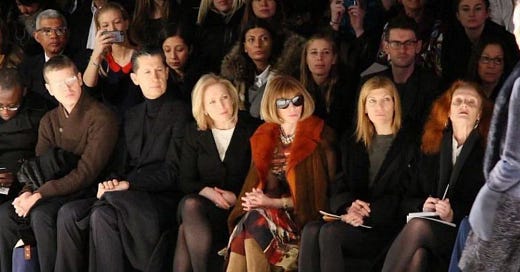I recently came across a Reddit thread aptly titled "Fashion Criticism Quietly Died (NOC)." In it, a fierce debate was taking place regarding fashion criticism and its very existence-or nonexistence- today. As one contributor noted: “Anytime you talk about fashion, you will invariably be talking about the products that designers are currently trying to sell. That’s inevitable.
“But that’s not the whole story” it continues.”Writing and talking about fashion from a critical perspective also means talking about what new designs mean in terms of the broader style continuum, why we should be interested in a certain new designer aside from the fact that their clothes are selling well and Justin Bieber wears them, what types of subcultures are reclaiming and reinterpreting certain styles in ways that give them new meaning.”
“Being able to identify and discuss this stuff is what gives you authority as a writer, so I know you’re not just some badly paid freelancer who threw together this ‘best chinos to wear in 2023’ list an hour before the deadline.”
That left me wondering. Has fashion criticism really died? A long time ago, Charles Baudelaire said of criticism, it “should be partial, impassioned, and political, that is to say, written from an exclusive point of view that opens up the widest horizons.” Meant to educate and ignite public discourse, criticism as a literary genre flourishes free of all conventions.
Today though the relationship between fashion media and the fashion industry is one of mutual economic dependence." Fashion journalism cannot be seen as being separate from fashion itself. The two are symbiotic” notes Kate Nelson Best in the History of Fashion Journalism.
Agreed. But how can you criticize an industry that is all merch? In our post-apocalyptic times, criticism also became a commodity, bought and sold according to the sponsors. And it's concealed in everything. “Anything can be turned into merch if infused with enough symbolic value and cultural capital,” Eugene Rabkin and Ana Andjelic said in their most recent HighSnobiety article.
A recent Totally Recommend Substack article better summarized the state of today’s merch-plagued fashion criticism: “Because now, nearly every corner of the internet blurs the lines, weaving advertisements into the fabric of personal stories and lifestyle posts so seamlessly that you're halfway to buying a $900 pair of pants before you realize you've been sold to. Not by a brand, but by someone who just yesterday was sharing their favorite lasagna recipe.”
And now what? The future of criticism might be found in the words of a Reddit contributor: "I think we need to bring back the professional critic, whose income doesn’t depend on what and how he/she reviews. A tenured critic of sorts. Or an independently wealthy aristocrat-critic.”
Or just really good AI critics.






This is so interesting to think about. "The independently wealthy aristocrat critic" immediately made me think of all the snobs in media (film and literature) whom the audience is automatically expected to hate. Because they don't give out their "Yes" at the drop of a pretty dime. They can't be bought by whatever organization is relying on their good word. They're "hard-asses," so the average bloke is less-inclined to trust them anyway. But today's critic is your friendly neighborhood soccer Mom who makes quilts in her free time. If she says, "omg, totally get this $700 vintage quilt from..." the average bloke is more likely to listen to her. It's just fascinating to think about how the culture machine is basically training us into its perfect consumer.